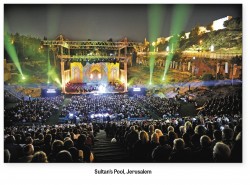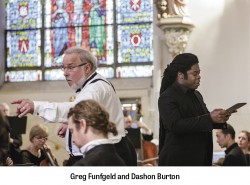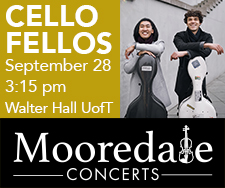 According to Chaucer, April is the month that with its sweet showers “pierces March’s drought to the root,” causing all kinds of people, music lovers not excepted, to get a bit giddy and take themselves off on all manner of “sundry pilgrimages.” As a lifelong chronic agoraphobe who typically gets on airplanes only for trips revolving around grim duty of one kind or another, I was until last year, a steadfast exception to the Chaucerian rule. But 2016 was different. Not once but twice I noted my nearest exits, turned off all electronic devices and faithfully obeyed the fasten seatbelt sign as I took off into the wide blue yonder for the purpose of attending music festivals in other parts of the world.
According to Chaucer, April is the month that with its sweet showers “pierces March’s drought to the root,” causing all kinds of people, music lovers not excepted, to get a bit giddy and take themselves off on all manner of “sundry pilgrimages.” As a lifelong chronic agoraphobe who typically gets on airplanes only for trips revolving around grim duty of one kind or another, I was until last year, a steadfast exception to the Chaucerian rule. But 2016 was different. Not once but twice I noted my nearest exits, turned off all electronic devices and faithfully obeyed the fasten seatbelt sign as I took off into the wide blue yonder for the purpose of attending music festivals in other parts of the world.I am, therefore, now an expert on the subject of music festivals. So pay attention.
Rule number one: Other than the ones that take place in your hometown and can therefore be ignored unless you have guests, there are only two types of festivals.
One is the kind of festival that is sufficiently compelling in its own right that it causes you to journey some place you never have thought of visiting, even if you had heard of it.
The other is a festival you never heard of but taking place somewhere so special in its own right that you feel compelled to go there at least once in your lifetime. And when you do, you discover that there’s a festival there that tickles your musical fancy, so you go to it because you are already there.
There’s one of each kind in this story: the 2016 first annual Jerusalem Summer Opera Festival falls into the second category; the 110th Annual Bethlehem Bach Festival falls into the first.
 The Bethlehem Bach Festival takes place in Bethlehem, PA, nestled in the Lehigh Valley region of Southeastern Pennsylvania, this year on the weekends of May 12-13 and May 19-20. Colonized in the first half of the 18th century by Moravian settlers, Bethlehem became also, in the 1860s (across the river from the old town), the site of Lehigh University, a private school established by businessman Asa Packer. (The church that bears his name, on the Lehigh campus, remains the venue for the performance of the Bach Mass in B Minor that is the climax of each year’s festival.) And between the two halves of the town, along the riverbank is the looming rusting hulk of what was, from the 1880s till the 1990s, the steel mill from which Bethlehem Steel derived its name. Twelve years after the mill was built, in 1898, the Bethlehem Bach Choir came into being. Two years after that it gave the first ever complete North American performance of Bach’s B Minor Mass. Through that whole galvanic century, the choir and the festival have endured through thick and thin, because they bring to the music not just a consistently high standard of musicianship, but a precious intangible – the fact that the music is a living expression of community.
The Bethlehem Bach Festival takes place in Bethlehem, PA, nestled in the Lehigh Valley region of Southeastern Pennsylvania, this year on the weekends of May 12-13 and May 19-20. Colonized in the first half of the 18th century by Moravian settlers, Bethlehem became also, in the 1860s (across the river from the old town), the site of Lehigh University, a private school established by businessman Asa Packer. (The church that bears his name, on the Lehigh campus, remains the venue for the performance of the Bach Mass in B Minor that is the climax of each year’s festival.) And between the two halves of the town, along the riverbank is the looming rusting hulk of what was, from the 1880s till the 1990s, the steel mill from which Bethlehem Steel derived its name. Twelve years after the mill was built, in 1898, the Bethlehem Bach Choir came into being. Two years after that it gave the first ever complete North American performance of Bach’s B Minor Mass. Through that whole galvanic century, the choir and the festival have endured through thick and thin, because they bring to the music not just a consistently high standard of musicianship, but a precious intangible – the fact that the music is a living expression of community.
I’ve written before about how my first awareness of the Bethlehem Bach Festival came about because of the non-stop procession of top-flight Canadian soloists to the festival, especially since Greg Funfgeld took on conductorship of the choir in 1983. Countertenor Daniel Taylor, for example, returns for the 19th consecutive year, joined again this year by soprano Agnes Zsigovics (a protégée of Taylor’s at the University of Toronto, and surely a performer to watch) and by Benjamin Butterfield, also a frequent visitor but absent last year. The three US soloists are also regulars: soprano Rosa Lamoreaux, baritone William Sharp and Dashon Burton, bass. One of Funfgeld’s gifts as a conductor is his sense of balance and blend; another is his loyalty to his performers. Talk to the soloists and they will tell you that as much as anything, the opportunity to renew beloved musical relationships in a consistent context is one of the things that keeps them coming back.
It’s been said that North America (at least from a colonial perspective) has too much geography and not enough history, while the problem in the Middle East is just the reverse. But if one thinks local rather than global, the distinction starts to blur. Walk from the Hotel Bethlehem (built in the 1920s with Bethlehem steel!) through the old Moravian Quarter, across the bridge past the hulk of the steel mill, where signs of civic landscaping and urban renewal are visibly starting to happen on the river edge, up the opposite hill to the Packer Church, and take your place in the audience. There will always be more than one generation of the same family in the choir that looks back at you. And the music, when it starts, will have a healing sound that is only possible when it is as current as it is timeless.
Jerusalem Opera Festival: Last summer’s trip to the Jerusalem Opera Festival had several memorable moments. One was sitting, late at night, on the rooftop licenced patio of the Mamilla Hotel in downtown Jerusalem, after returning from the evening’s main event, a thoroughly enjoyable outdoor performance of Rigoletto at the 6000-seat Sultan’s Pool amphitheatre, a few hundred feet down the hill. There’s something infinitely less annoying about amplification and outdoor acoustics when the surroundings are as genuinely imposing. (Although I do remember thinking, as an ambulance barrelled down the hill, klaxon blaring, alongside the amphitheatre, right on cue, that maybe this time Gilda would be saved! The second night’s performance, at the Sultan’s Pool again, titled “Opera Paradiso,” was, to my taste less successful, featuring a range of operatic moments from film, sung and performed live by singers and orchestra while the related movie excerpts flickered silently onscreen.
I found myself wondering if there was perhaps a trap for the festival in trying to attract the same 6000 people two days in a row to the one venue, rather than setting the goal of doing the same show twice in a row to grow the audience, and to lay on other things, large and small, for each audience on their “other” night. A better way to build partnerships in the community, said my small-town brain.
As it happens, this year’s Jerusalem Festival has just been announced, and someone else must have been thinking along the same lines I was. There will be two performances of Nabucco, June 21 and 22 at Sultan’s Pool. It will be very interesting to see what else, if anything, operatic or not, gets programmed head to head with those two performances.
My favourite story from the whole visit indicates the size of the challenge ahead. We were in Tel Aviv, home base of the Israeli Opera, at the end of the visit, being shown around the props and costumes room, backstage. Our guide, an opera staff member, was talking frankly about how the two cities were completely different worlds. (“It’s an hour’s drive at a speed of 30 centuries an hour,” someone said.) The NIOC staffer described how her own children, growing up backstage among the props and costumes, had never even been to Jerusalem until they were five or six years old. Holding tight to her hand as they walked through the souks with their dizzying variety of cultural and religious garb, one of the children turned to her, pointing at someone walking by in unfamiliar attire. “Mommy, what costume is that?” the child asked.
The greatest challenge for this particular festival, it seems to me, is that Jerusalem as a city is itself a living opera, on a grander, more viscerally demanding scale than anything the arts can hope to muster. It will be interesting to see how much attention this particular festival can hope to grab moving forward.
David Perlman can be reached at publisher@thewholenote.com.



